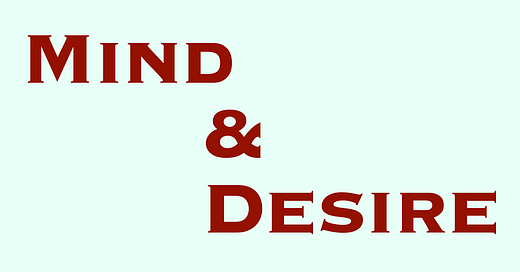I think that at this point, a number of you have heard me talk at one point or another about Alasdair MacIntyre, the Scottish philosopher who wound up doing a lot of his work over here in the United States. And you may or may not know that about 20 years ago, I actually got to meet him because I participated in what was called the Erasmus Institute Faculty Fellowship in the summer of 2005, hosted by the Erasmus Institute at Notre Dame University. And that was kind of a big honor. I'll tell you a little bit about the story of how I got in there in just a moment.
But a little bit of lead up before I get into that. So as I was walking to the office today, I was thinking about MacIntyre. And I'm not exactly sure why this came up, perhaps because I was thinking about Gabriel Marcel, another important philosopher from France in the 20th century, somebody who I particularly like. Maybe down the line, I'll tell you a bit more about him and why I like his work and teach it and keep going back to it. And I was thinking about this conversation that I had with MacIntyre in his office at Notre Dame.
This was in the fall of months after the fellowship had finished up, and I was mentioning to him how his work engaged with a lot of the same themes that Gabriel Marcel's work did, but that I'd never seen him actually write about Marcel. And I was also thinking about how McIntyre reacted to that and what was going on in that meeting. So I'll come back to that in just a moment. I'll tell you first about this fellowship.
I was at that time three years out of graduate school. I had defended my dissertation on Maurice Blondel. I was doing some research work on this big project that eventually culminated in my first book, Reason Fulfilled by Revelation: The 1930s Christian Philosophy Debates in France. And so that tells you what that book was about.
And I was also teaching at Indiana State Prison. We had to cover the entire philosophy and religious studies curriculum because it was a four year bachelor's degree program. And I was one of two people in the Department of Philosophy and Religious Studies who taught there. The other guy who taught there, he was only there part time. I was there full time. So I was pretty busy, but still quite interested in the various fields that I was researching and writing in and pursuing, doing a lot of work also on Anselm of Canterbury, some work on Aristotle, some on Hobbes. So you can say I was spread out over a number of different places.
I had encountered Alasdair MacIntyre's work back in graduate school, in part because one of his books - it was either After Virtue or Whose Justice, Which Rationality - was in our value fields reading list for our preliminary examination. And I'd heard good things about his stuff, so I started reading him back then. I read both of those books as well as some other stuff as well. And I very much liked the approach to the history of ideas that he was sketching out. He seemed a rather down-to-earth sort of author, but I didn't know anything about the guy himself.
So I saw an advertisement to apply for this summer fellowship. And it was a really interesting one. The title of the fellowship was Practical Rationality: Rational Decision Theory, Aristotelian Thomism, and Freudian and Lacanian Psychoanalysis. And I thought, whoa, that actually could be quite good. The opportunity to get to study for two intensive weeks at Notre Dame with Alasdair MacIntyre would have been attractive enough. But as it so happened, I had a background, as I read through the description, in all three of these areas.
Now, if you know MacIntyre, you know that he likes to set up triads of different, let's call them approaches, movements, he uses the word traditions, within moral or even epistemological theory and compare and contrast them with each other, try to bring them into dialogue with each other. So I thought wow this would be really great! I could see this guy at work and I would have something to contribute to the conversation.
So I wrote up the application and sent it off and then i got a letter back in the mail saying hey you're in You're one of 12 people. Here's the list of the other people. And it was very funny because as I was reading down this list, I realized that I was by far the most junior of scholars involved in this. And I was not at any sort of prestigious university like most of these people were. So I was really looking forward to it.
I think it happened either in June or July. I drove out to Notre Dame bringing my computer with me and some books and some other things as well. And I went to this seminar where we began the morning having breakfast together. MacIntyre wasn't at breakfast, but all the rest of us were. And then we would meet in a seminar room for an intensive three-hour session with him where he would do some lecturing. We'd do a lot of discussion and present some ideas, and then we would break for lunch, come back for the afternoon, have another intensive session. Then we would have dinner, and then we were on our own,
So I would spend a lot of my alone time over in the Hesburgh Library working on this project of mine, and I also got to present some of that project while I was there, because each one of us in the second week had to sort of present what we were doing. So I looked at the Christian philosophy debate and current Christian philosophy in terms of traditions in a Macintyrian way, and he actually surprised me giving me a manuscript afterwards of his own translation of one of the texts that I was translating and said that I could compare his translation with mine if I wanted to.
It was a wonderful experience. There was a lot of really interesting discussion going on. And then it came to an end. One of the things that all of the other people were doing at that time, and I didn't do at that time, because I lived only an hour and a half from Notre Dame, so I could basically go there anytime I wanted to, was to have a one-on-one session with MacIntyre over in his office talking through some of these ideas that they wanted to propose. And so I said, well, I'll just meet with you down the line. And later on we emailed and that was how this came about.
So in, I want to say, October, because it was already starting to get kind of cool, I drove out to Notre Dame and I parked and walked over to his office and he met me there and he said, let's go up and have a chat and then we'll go to lunch. And if you want, you can come to one of my classes and see how that goes.So we did exactly that. And the chat was very interesting because, as it turned out, I found out how I actually got into this rather prestigious fellowship program.
A significant part of it was the fact that he was interested in my prison teaching and wanted to talk about what that's like, what the prisoners were like, what they were interested in, how scholarship could inform prison teaching. And he also wanted to know about this guy who he hadn't read, Maurice Blondel, who I'd done my dissertation on, and whether there was anything in his works that might be worthwhile for MacIntyre himself to engage with.
Now, remember, too, that MacIntyre, at the time that we were meeting up like this, would have been probably in his late 70s and certainly could have retired if he wanted to, was not in the best of health, but he was still very, very committed to doing the kind of work that he had been doing for decades, a really intensive philosophical dialogue and engagement with other ways of thinking to see what you can take from them for whatever became in his work an Aristotelian-Thomist framework.
So when I brought up Gabriel Marcel, MacIntyre knew who he was, but admitted to me that he really hadn't read him. And I think what that meant is he probably had, but decades back and then had forgotten about it. And I said, well, you know, there's a lot of similar ideas in in your work and his work, and I think it would be, in fact, quite productive for you to check him out. And so he said, yeah, okay, that makes sense. I will definitely check him out.
And to me, that was kind of an interesting surprise, but a confirmation of the type of person that I had gotten to know him to be, which is somebody who really walks the walk, not just in virtue ethics, rather than just talking the talk, but also with his commitment to inquiry. If there was something out there that somebody whose opinion he valued and apparently he valued mine in this respect, thought he should check out, he would go and do the groundwork, even though he didn't have to, even though he had a million other things to do. And that made a huge impression on me.
I will say that over the years, MacIntyre and I have not been in a lot of contact with each other we sort of lost touch although i could tell you stories about the 10 years that followed after that where he did give me some interesting ideas and guidance and acted in a very friendly way to me writing letters of recommendation telling me that the work I was doing down at Fayetteville State University although rather onerous was important for the students who were there.
He made a big impression on me as a young scholar and young philosopher. And I'm very grateful for having crossed paths and having had dialogue with him. on that because it's, in some respects, not the diametric opposite of what you see in so many academic professionals, but it certainly is something quite different from it, a genuine personal connection that I think for some of us can be quite important.
So I thought I would share that story with you about a scholar who certainly could have sat on his laurels, but deliberately refused to do so in ways that I got to see myself in my engagements with him.













Share this post